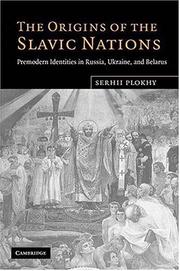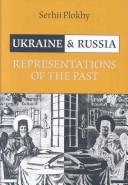| Listing 1 - 10 of 34 | << page >> |
Sort by
|
Book
ISBN: 9780465056965 0465056962 Year: 2014 Publisher: New York, N.Y. Basic Books a Member of the Perseus Books Group
Abstract | Keywords | Export | Availability | Bookmark
 Loading...
Loading...Choose an application
- Reference Manager
- EndNote
- RefWorks (Direct export to RefWorks)
This book describes the collapse of the Soviet Union in 1991, dispelling the myth that the event was spurred on in part by the close relationship between George H. W. Bush and Mikhail Gorbachev.
International relations. Foreign policy --- Internal politics --- anno 1980-1989 --- anno 1990-1999 --- Russian Federation --- Internal politicsanno 1980-1989 --- anno 1990-1999Russian Federation --- Russia
Book
ISBN: 9781107022102 9781139135399 9781107449039 9781139526173 1139526170 1139135392 9781139528566 1139528564 9781139532037 1139532030 9781139530842 1139530844 9781139530842 110702210X 9781283574761 1283574764 1107449030 1139540165 1107231663 1139527371 9786613887214 Year: 2012 Volume: *35 Publisher: Cambridge Cambridge University Press
Abstract | Keywords | Export | Availability | Bookmark
 Loading...
Loading...Choose an application
- Reference Manager
- EndNote
- RefWorks (Direct export to RefWorks)
In the years following the Napoleonic Wars, a mysterious manuscript began to circulate among the dissatisfied noble elite of the Russian Empire. Entitled The History of the Rus', it became one of the most influential historical texts of the modern era. Attributed to an eighteenth-century Orthodox archbishop, it described the heroic struggles of the Ukrainian Cossacks. Alexander Pushkin read the book as a manifestation of Russian national spirit, but Taras Shevchenko interpreted it as a quest for Ukrainian national liberation, and it would inspire thousands of Ukrainians to fight for the freedom of their homeland. Serhii Plokhy tells the fascinating story of the text's discovery and dissemination, unravelling the mystery of its authorship and tracing its subsequent impact on Russian and Ukrainian historical and literary imagination. In so doing he brilliantly illuminates the relationship between history, myth, empire and nationhood from Napoleonic times to the fall of the Soviet Union.
Cossacks --- Nationalism --- Cosaques --- Nationalisme --- Ukraine --- History --- Folklore --- Histoire --- Istoriia Rusov. --- Istoriia Rusov --- Authorship. --- Russia --- Russie --- Foreign relations --- Relations extérieures --- Istorii͡a Rusov. --- Istorii͡a Rusov --- Relations extérieures --- History. --- Folklore. --- Imperialism --- Cozacks --- Kozaks --- Ethnology --- Історія Русовъ --- Istorii︠a︡ Rusiv --- Istorīi︠a︡ Rusov ili Maloĭ Rossīi --- Исторія Русовъ или Малой Россіи --- Istorii︠a︡ Russov --- An Úcráin --- I-Yukreyini --- IYukreyini --- Malorosii︠a︡ --- Małorosja --- Oekraïne --- Ookraan --- Oukraïne --- Oykrania --- Petite-Russie --- U.S.R.R. --- Ucrægna --- Úcráin --- Ucraina --- Ucrania --- Ucrayena --- ʻUkelena --- Ukraïna --- Ukrainæ --- Uḳraʼinah --- Ukrainian Council Socialist Republic --- Ukrainian S.S.R. --- Ukrainian Socialist Soviet Republic --- Ukrainian Soviet Socialist Republic --- Ukrainio --- Ukrainmudin Orn --- Ukraïnsʹka Radi︠a︡nsʹka Sot︠s︡ialistychna Respublika --- Ukrainska Radyanska Sotsialistychna Respublika --- Ukrainska Sotsialistychna Radianska Respublika --- Ukraïnsʹka Sot︠s︡ii︠a︡listychna Radi︠a︡nsʹka Respublika --- Ukrainskai︠a︡ Sovetskai︠a︡ Sot︠s︡ialisticheskai︠a︡ Respublika --- Ukrainskaya Sovetskaya Sotsialisticheskaya Respublika --- Ukrainujo --- Ukrajina --- Ūkrāniyā --- Ukranya --- Ukrayiina --- Ukrayina --- Ukrayna --- Ukuraina --- Ukyáña --- Wcráin --- Yn Ookraan --- Yr Wcráin --- Yukrain --- Ουκρανία --- Украинæ --- Украина --- Украинэ --- Украинмудин Орн --- Україна --- אוקראינע --- אוקראינה --- أوكرانيا --- ウクライナ --- 우크라이나 --- Ukraine (Hetmanate : 1648-1782) --- Rossīi︠a︡ --- Rossīĭskai︠a︡ Imperīi︠a︡ --- Russia (Provisional government, 1917) --- Russia (Vremennoe pravitelʹstvo, 1917) --- Russland --- Ṛusastan --- Russia (Tymchasovyĭ uri︠a︡d, 1917) --- Russian Empire --- Rosja --- Russian S.F.S.R. --- Russia (Territory under White armies, 1918-1920) --- Relations --- Historiography. --- Istorii︠a︡ Rusov. --- Istorii︠a︡ Rusov --- Arts and Humanities
Book
ISBN: 9781932650099 1932650091 Year: 2012 Publisher: Cambridge : Harvard Ukrainian Research Institute,
Abstract | Keywords | Export | Availability | Bookmark
 Loading...
Loading...Choose an application
- Reference Manager
- EndNote
- RefWorks (Direct export to RefWorks)
Poltava, Battle of, Poltava, Ukraine, 1709 --- Northern War, 1700-1721 --- Bataille de Poltava, Poltava, Ukraine, 1709 --- Guerre du Nord, 1700-1721 --- Campaigns --- Campagnes et batailles --- Mazepa, Ivan Stepanovych, --- Ukraine --- History --- Histoire --- Slaget vid Poltava 1709 --- Poltava, Battle of, Poltava, Ukraine, 1709. --- Slaget vid Poltava 1709.

ISBN: 9780521155113 0521864038 9780521864039 9780511496837 0511246358 9780511246357 9780511247040 0511247044 9786610703692 6610703698 0511244878 0511496834 0521155118 1107169232 1280703695 0511318847 0511245645 Year: 2006 Publisher: Cambridge, UK ; New York : Cambridge University Press,
Abstract | Keywords | Export | Availability | Bookmark
 Loading...
Loading...Choose an application
- Reference Manager
- EndNote
- RefWorks (Direct export to RefWorks)
This book documents developments in the countries of eastern Europe, including the rise of authoritarian tendencies in Russia and Belarus, as well as the victory of the democratic 'Orange Revolution' in Ukraine, and poses important questions about the origins of the East Slavic nations and the essential similarities or differences between their cultures. It traces the origins of the modern Russian, Ukrainian and Belarusian nations by focusing on pre-modern forms of group identity among the Eastern Slavs. It also challenges attempts to 'nationalize' the Rus' past on behalf of existing national projects, laying the groundwork for understanding of the pre-modern history of Russia, Ukraine and Belarus. The book covers the period from the Christianization of Kyivan Rus' in the tenth century to the reign of Peter I and his eighteenth-century successors, by which time the idea of nationalism had begun to influence the thinking of East Slavic elites.
Slavs, Eastern --- Ethnic identity. --- History. --- Origin. --- Religion. --- Europe, Eastern --- Slavic countries --- Kievan Rus --- East Slavs --- Eastern Slavs --- Kyivan Rus --- Drevni︠a︡i︠a︡ Rusʹ (Medieval state) --- Kieŭskai︠a︡ Rusʹ --- Kievskai︠a︡ Rusʹ (Medieval state) --- Kiev (Medieval state) --- Kyivan Rusʹ --- Kyïvsʹka Rusʹ --- Ruce --- Rusʹ --- Rus' Kieviana --- Древняя Русь --- Киевская Русь --- Київська Русь --- Русь --- Arts and Humanities --- History --- Slaves --- Russie --- Ukraine --- Histoire

ISBN: 9780802093271 0802093272 Year: 2007 Publisher: Toronto ; Buffalo : University of Toronto Press,
Abstract | Keywords | Export | Availability | Bookmark
 Loading...
Loading...Choose an application
- Reference Manager
- EndNote
- RefWorks (Direct export to RefWorks)
Nationalism --- Nationalisme --- History --- Histoire --- Ukraine --- Russia --- Russie --- Historiography. --- Historiographie. --- Historiographie
Book
ISBN: 9780465098491 Year: 2017 Publisher: New York : Basic Books,
Abstract | Keywords | Export | Availability | Bookmark
 Loading...
Loading...Choose an application
- Reference Manager
- EndNote
- RefWorks (Direct export to RefWorks)
In 2014, Russia annexed the Crimea and attempted to seize a portion of Ukraine. While the world watched in outrage, this blatant violation of national sovereignty was only the latest iteration of a centuries-long effort to expand Russian boundaries and create a pan-Russian nation. The author argues here that we can only understand the confluence of Russian imperialism and nationalism today by delving into the nation's history. Spanning over 500 years, from the end of the Mongol rule to the present day, the author shows how leaders from Ivan the Terrible to Joseph Stalin to Vladimir Putin exploited existing forms of identity, warfare, and territorial expansion to achieve imperial supremacy. An authoritative and masterful account of Russian nationalism, this book chronicles the story behind Russia's belligerent empire-building quest.
NATIONALISM--RUSSIA --- NATIONALISM--USSR --- RUSSIA--HISTORY --- RUSSIA--TERRITORIAL EXPANSION --- USSR--HISTORY --- USSR--TERRITORIAL EXPANSION --- UKRAINE--HISTORY --- BELARUS--HISTORY --- IMPERIALISM--HISTORY
Book
ISBN: 9780141980614 Year: 2016 Publisher: London : Penguin Books,
Abstract | Keywords | Export | Availability | Bookmark
 Loading...
Loading...Choose an application
- Reference Manager
- EndNote
- RefWorks (Direct export to RefWorks)
Book
ISBN: 9789000360789 9789000360796 9000360781 900036079X Year: 2018 Publisher: Houten Spectrum
Abstract | Keywords | Export | Availability | Bookmark
 Loading...
Loading...Choose an application
- Reference Manager
- EndNote
- RefWorks (Direct export to RefWorks)
Ruslands hunkering naar een wereldrijkToen Rusland in 2014 de Krim annexeerde stond de wereld grotendeels in shock toe te kijken bij deze schending van de soevereiniteit van een ander land. Dit was echter niet de eerste, maar een van vele Russische inspanningen om de Russische grenzen te verleggen en het pan-Russische ideaal te verwezenlijken ? de vereniging van mensen en gebieden met de Russische etniciteit, cultuur en identiteit.dentiteit vormt een kernpunt in de Russische geschiedenis: tijdens de laatste vijfhonderd jaar werd die op vele verschillende manieren gedefinieerd. Het verloren koninkrijk volgt de geschiedenis van de opbouw van de Russische identiteit tot aan onze tijd. Centraal staan de politieke leiders, van Ivan de Verschrikkelijke en Stalin tot Poetin, die allen bestaande vormen van die identiteit exploiteerden en nieuwe varianten bedachten om hun wereldrijk uit te breiden. Een meesterlijke geschiedenis van het Russische nationalisme die Poetins politiek in een nieuwe context plaatst.Serhii Plokhy is historicus, werkzaam als professor Oekraïense Geschiedenis aan Harvard University en de directeur van het Harvard Ukrainian Research Institute. Hij heeft meerdere boeken over Oekraïne, Rusland en Oost-Europa geschreven, inclusief het veelvuldig bekroonde Lost Empire.Bron : http://www.bol.com
Political philosophy. Social philosophy --- Political systems --- Economic policy and planning (general) --- History of Eastern Europe --- Russia --- Rusland --- Geschiedenis --- Politieke geschiedenis --- Geneeskunde --- Techniek (wetenschap) --- Atlas --- Museum
Book
ISBN: 9780241454732 Year: 2021 Publisher: UK Allen Lane, an imprint of Penguin Books
Abstract | Keywords | Export | Availability | Bookmark
 Loading...
Loading...Choose an application
- Reference Manager
- EndNote
- RefWorks (Direct export to RefWorks)
For more than four weeks in the autumn of 1962 the world teetered. The consequences of a misplaced step during the Cuban Missile Crisis could not have been more grave. Ash and cinder, famine and fallout; nuclear war between the two most-powerful nations on Earth. The author tells here the riveting story of those weeks, tracing the tortuous decision-making and calculated brinkmanship of John F. Kennedy, Nikita Khrushchev and Fidel Castro, and of their advisors and commanders on the ground. More often than not, the author argues, the Americans and Soviets simply misread each other, operating under mutual distrust, second-guesses and false information. Despite all of this, nuclear disaster was avoided thanks to one very human factor : fear.
Polemology --- anno 1960-1969 --- Russia --- Cuba --- United States --- CUBAN MISSILE CRISIS, 1962 --- COLD WAR --- USA--FOREIGN RELATIONS--USSR --- USA--FOREIGN RELATIONS--CUBA --- USSR--FOREIGN RELATIONS--USA --- CUBA--FOREIGN RELATIONS--USA --- United States of America
Book
ISBN: 9780141983134 Year: 2018 Publisher: UK Penguin Books
Abstract | Keywords | Export | Availability | Bookmark
 Loading...
Loading...Choose an application
- Reference Manager
- EndNote
- RefWorks (Direct export to RefWorks)
National characteristics, Russian. --- Nationalism --- Russia --- Soviet Union --- History. --- History of Eastern Europe
| Listing 1 - 10 of 34 | << page >> |
Sort by
|

 Search
Search Feedback
Feedback About UniCat
About UniCat  Help
Help News
News